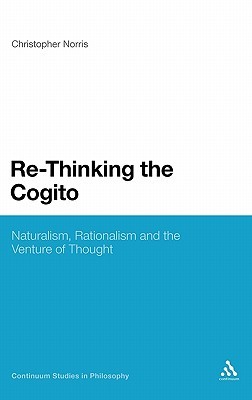
- We will send in 10–14 business days.
- Author: Christopher Norris
- Publisher: CONTINNUUM 3PL
- ISBN-10: 1441171541
- ISBN-13: 9781441171542
- Format: 15.6 x 23.4 x 1.8 cm, kieti viršeliai
- Language: English
- SAVE -10% with code: EXTRA
Reviews
Description
Re-Thinking The Cogito argues for a bold new approach to some enduring problems in philosophy of mind combining naturalistic and rationalist perspectives. Rejecting the common view that these perspectives offer incompatible conceptions of mind and knowledge it looks for ways of uniting a strong naturalism, drawing on advances in cognitive science with an outlook that acknowledges those normative values at the heart of rationalist thought. Norris thoroughly critiques positions adopted by advocates of a;moderate; naturalizing view and offers a range of recommendations concerning the means by which naturalism and rationalism might be brought into a mutually enhancing relationship. He goes on to find that claim prefigured in Spinoza development of a non-reductive yet uncompromising mind/body monism. The book also suggests how a thoroughly naturalized philosophy of mind might yet productively engage with the work of an ultra-rationalist thinker like Badiou. Norris follows Spinoza and Badiou in maintaining that embodied human thought has cognitive, intellectual and creative powers that cannot be accounted for in terms of conscious
EXTRA 10 % discount with code: EXTRA
The promotion ends in 23d.01:08:31
The discount code is valid when purchasing from 10 €. Discounts do not stack.
- Author: Christopher Norris
- Publisher: CONTINNUUM 3PL
- ISBN-10: 1441171541
- ISBN-13: 9781441171542
- Format: 15.6 x 23.4 x 1.8 cm, kieti viršeliai
- Language: English English
Re-Thinking The Cogito argues for a bold new approach to some enduring problems in philosophy of mind combining naturalistic and rationalist perspectives. Rejecting the common view that these perspectives offer incompatible conceptions of mind and knowledge it looks for ways of uniting a strong naturalism, drawing on advances in cognitive science with an outlook that acknowledges those normative values at the heart of rationalist thought. Norris thoroughly critiques positions adopted by advocates of a;moderate; naturalizing view and offers a range of recommendations concerning the means by which naturalism and rationalism might be brought into a mutually enhancing relationship. He goes on to find that claim prefigured in Spinoza development of a non-reductive yet uncompromising mind/body monism. The book also suggests how a thoroughly naturalized philosophy of mind might yet productively engage with the work of an ultra-rationalist thinker like Badiou. Norris follows Spinoza and Badiou in maintaining that embodied human thought has cognitive, intellectual and creative powers that cannot be accounted for in terms of conscious


Reviews